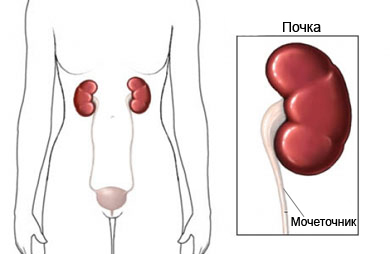Biopsy pochek – Pochechnaya biopsy
Description renal biopsy
Biopsy pochki – removal of cells or a small piece of kidney tissue. Pathologist (doctor, specializes in diagnosing tissue) explores selected material under a microscope to search for deviations.

Causes of renal biopsy
A kidney biopsy is done to diagnose kidney disease or health assessment.
A kidney biopsy may be done, if there are the following deviations:
- Blood in the urine;
- High levels of protein in urine;
- Poor kidney function;
- Extraneous growths on kidneys;
- Kidney Infections;
- Cyst on the kidney.
After examining the tissue doctor can make a diagnosis and prescribe treatment.
If the patient was performed kidney transplant surgery, biopsy can be done, to determine the degree of functioning of the new kidney.
Possible complications when performing renal biopsy
Complications are rare, but no procedure does not guarantee the absence of risk. Before, how to perform a renal biopsy is necessary to be aware of possible complications, which may include:
- Bleeding;
- Infection;
- Pain.
Factors, that may increase the risk of complications:
- Smoking.
How is renal biopsy?
Preparation for the procedure
- Prior to biopsy the doctor may prescribe a urine test, blood tests and X-rays of the kidneys;
- We need to ask the doctor, when to expect the results of the biopsy;
- It is necessary to arrange a ride home after the biopsy;
- The doctor may ask the patient to fast before a biopsy or a little there;
- It may be necessary to stop taking some medicines:
- Aspirin or other anti-inflammatory drugs;
- Blood thinners, eg, clopidogrel (Plaviks) or warfarin (Kumadin).
Anesthesia
Local anesthesia is used – to anesthetize the area, which is subjected to a biopsy procedure. They may also be used sedatives, to help the patient relax.
Procedure renal biopsy
This procedure is usually performed on an outpatient basis without the need for hospitalization. The skin will be cleaned and decontaminated (on the back or abdomen). The doctor enters a local anesthetic to biopsy. Kidneys are examined using ultrasound and X-ray or. A long needle is inserted for the selection of a sample of tissue. For insertion of the needle can use a special tool. During the selection of the kidney tissue the patient should hold their breath. Once the samples are selected, in place of the needle will bandage.
How long will the biopsy of the kidney?
The procedure lasts about one hour.
Will it hurt during renal biopsy?
The local anesthetic will block the pain during the biopsy. Thereafter, the patient may feel pain at the biopsy. If necessary, the physician prescribes pain medication.
Posleprotsedurny care after renal biopsy
In the hospital
Within a few hours after the biopsy will be controlled by the state of health of the patient. Must stay in a supine position, to reduce the likelihood of bleeding. Will monitor the pulse and blood pressure. Biopsy samples are sent to a laboratory for testing. Once the patient returns to normal and the doctor deems, it's safe, you can go home.
Nursing homes
When you return home, you need to perform the following actions, to ensure the normal recovery:
- To prevent bleeding need to rest during the 24-48 hours after the biopsy. You can not lift weights and play sports without a doctor's permission;
- It is necessary to keep the venue clean and dry biopsy;
- When you visit the toilet must pay attention to the presence of urine and blood in it. First 24 it's normal hours. If there is bleeding for more 24 hours after the procedure, or a lot of blood in the urine, you need to see a doctor.
It is necessary to go to the hospital in the following cases
- Bloody urine through 24 hours after biopsy or a lot of blood in the urine;
- Difficulty urinating;
- Signs of infection, including fever and chills;
- Dizziness;
- The increasing pain at the biopsy site;
- Inability to relieve pain using painkillers;
- Constant desire to urinate;
- Pain or burning during urination;
- Redness or discharge at the site of the biopsy.
